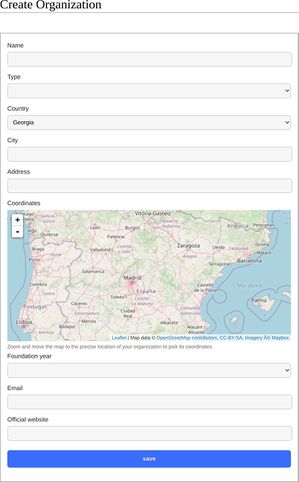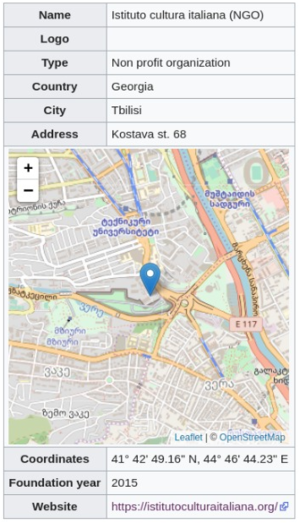Main Page
This is the back-end side of the platform culturaitaliana.org mainly intended to create and edit contents in a collaborative way. For a streamlined navigation and interactive features go here |
Cultura italiana is a project aiming to create a network and to enhance cooperation among centers of Italian culture and language at abroad.
It is meant to be composed of at least 2 components: a back-end platform, represented by this Mediawiki site where authorized staff of centers of Italian culture and language can add or structure their organization information in a collaborative way and with attention for semantic data, and by a front-end platform, currently represented by this site, where the created contents can be viewed, searched and enjoyed by visitors in an attractive and modern way, including from mobile devices. (depending on what side you are reading this content, one of the links will point to itself)
The project has been initially implemented, since November 2019, within the frame of a European Solidarity Corps project (funded by European Union), is supported at the moment by the center of Italian culture and language in charge of the project which ensures its continuity over time (as well as that the requirements of the project are met) and foresees the inclusion of other institutions and organizations interested in taking part to the initiative.
With reference of the "back-end" part, we oriented ourselves to a Mediawiki system, because is open-source, it offers the most or one of the most reliable systems world-wide for creation and publishing of collaborative contents (thanks to the challenge posed by a critical application like Wikipedia) with a leading version control system (it allows simultaneous editing of the same content by different users, keeping track of the history of changes of each of them, and allowing the comparisons between any version's article with whatever other), and because it can be actually used as a collaborative CMS (content management system) with no hidden information and, once again, completely open source, including the functionalities to represent and to handle structured data, like templates, forms and Semantic Mediawiki.
The key-feature of the project is its ability to easily create semantic data out of simple forms, representing specific set of data (like articles, organizations themselves, meetings, scholarships and other opportunities, reading suggestions, and so forth) with the aim to let them easily accessed from the outside (specifically by the front-end part of the project, as well as by any other third-party, like the websites belonging to centers of Italian language and culture themselves) through either the standard Mediawiki APIs, callable notably by any Wordpress website through dedicated plugins, or by an extended APIs, which is even more effective, so that on the one hand the creation of contents can be centralized and kept separate by their presentation, and on the other they can be served among several platforms (including search engines, which explicitly encourage the use of structured data) thanks to the interoperability ensured by semantic data, and specifically of semantic “ask” queries.
Basically once that you have added a page representing your organization on this site, you can query for any data that you have inserted from the outside (using the standard Mediawiki's api endpoint) through a query like:
{
"action": "ask",
"format": "json",
"query": "[[~Centro italiano Barcellona*]] [[Category:Teachers]] [[Teacher taught languages::Italian]]"
}
which basically will return all teachers of Italian language in charge at the Italian center of Barcelona. (here is the api sandbox where you can play on your own).
Usually you do that with a concealed database, with an arbitrary data-structure in which the aspects of interoperability, accessibility, and cooperativeness are reduced to zero, and therefore which limit the use of your data to the original platform, which is typically "isolated" on the web: furthermore, information stored therein are not readable, as such, from third party systems, through an universal vocabulary which is indeed the aim of Wikidata, a project to which our is strictly related inasmuch as a wikibase repository is already installed and ready to use at this address, although we are currently relying on Semantic Mediawiki, because the federation feature of Wikidata/Wikibase at the year 2020 is not yet ready, and nonetheless we can do the steps in that direction all together. [*** update: in January 2021, Semantic Mediawiki's authors have done some steps in this direction, presented here, although a stable solution will not be usable before the 2nd quarter of 2021]
By contrast to the typical design of ordinary web sites and web applications, where the data structure is concealed, and not accessible or improvable from their users, in a semantic Mediawiki it is expressed in terms of sets of properties (of which here is the complete list]) which are stored among the contents themselves of the wiki! This is a breakthrough approach, because it makes possible for users themselves of the platform to modelize and to shape their own information based on their experience and their needs, and to contribute actively with it, instead than just passively adopting models imposed by others (or: "actively filling with contents models imposed by others") which are necessarily aimed to conflicting or incompatible interests.
Here is for instance a set of properties representing an organization:
- Organization address of type Text (1 use)
- Organization city of type Text (16 uses)
- Organization coordinates of type Geographic coordinates (1 use)
- Organization country of type Text (2 uses)
- Organization foundation year of type Number (1 use)
- Organization logo + of type URL (0 uses)
- Organization name of type Text (9 uses)
- Organization type of type Text (9 uses)
- Organization website of type URL (2 uses)
here is the corresponding form:
here is the template filled-in by the form above
{{Form organization
|Name=
|Type=
|Logo=
|Country=
|Address=
|Coordinates=
|Foundation year=
|Email=
|Website=
}}
and here are two elements produced using such data, that is an "Infobox", a summary of the semantic data (corresponding to the field names of an ordinary relational database) of the item (the organization)
and a "Factbox", with the same semantic information displayed by Semantic Mediawiki itself (installed on our wiki as an extension).
All of them, besides than filled-in with data, can be fully accessed (with regard of their "source code", more precisely a set of pages containing wiki-text) by users and even the related data-structure arbitrarily enriched to represent realities not fitting in a given model: a completely new model could be created to just fit one item, this is completely acceptable.
Furthermore, while the components above produce a clear summary of data, in the view of our project, they have not a merely aesthetic purpose – or rather: they are not merely intended to visitors, but rather to external platforms (namely all those focusing on linked data, starting with Wikidata) which as mentioned can query the APIs, and to use and display the information according to their needs: indeed, although the present site can of course be accessed and consulted by visitors in an autonomous way as whatever other wiki, is to be considered, as above, a sophisticated CMS and at the same time a laboratory for centers of Italian culture and language in order to shape their information in innovative ways, to enhance their cooperation at this regard (in our opinion of utmost importance, since adopted data structures and behavioral patterns are related) and to showcase such information on diverse and even separated front-ends.
Here is a summary of the several components of which this platform is composed.
- Introduction
- Application form
- Tips & guidelines
- Interface elements
- Pages structure
- Banner
- Semantic forms and structured data
- Images upload & gallery
- Page status & SEO
- Table of contents
- Front-end features
- Multiple choice questions
- Templates
- Forms & quizzes
- Private WIKIs
- Advanced use
- Join team
- Technology we use
- Logically related questions (L.R.Q.)
Cultura italiana is an open initiative and its team is formed by volunteers of centres of Italian language and culture in the world.
Here are the reading suggestions from members of centers of Italian language and culture all over the world!
- Alì Ehsani - Stanotte guardiamo le stelle - by
- Viviano Domenici - A cena con i cannibali. Taccuino di un giornalista esploratore - by
- Giacomo Scotti, Mario Licciardi - Non si trova cioccolata - by
- Yambo (Enrico de’ Conti Novelli da Bertinoro) - L'allevatore di dinosauri ovvero L'uovo di pterodattilo - by
- Raymond Queneau - Fiori Blu - by
This section is aimed to contain full-text open-source books retrieved from providers of digitized resources which allow contents redistribution (usually under attribution of the source and for non-profit use) and provided with some added value, like footnotes, introduction, presentation or abstract, illustrations, translation (specifically for books in Latin), and even Multiple choice questions !
In this section you will find the list of centers of Italian culture and language taking part to the project.
- Centro Italiano presso l'Università di Lingue dell'Azerbaigian
- Centro italiano test
- Istituto cultura italiana NCLE
Join the community!
If you wish to list your center here, just fill in this form:
Here are the latest calls, internships, scholarships and other opportunities concerning Italian language and culture entered from member of centers of Italian language and culture all over the world!
- Comune di Lucca ⧸ Istituto cultura italiana Tbilisi - იტალიური ენის ინტენსიური კურსი: მოგზაურობა იტალიაში - by
- Istituto cultura italiana Tbilisi - იტალიური ენის ინტენსიური კურსი: მოგზაურობა იტალიაში - by
- Universita della Calabria scholarships a.y. 2021-2022 - by
- Universita della Calabria - კალაბრიის უნივერსიტეტის სასწავლო სტიპენდია - by
- European Commission - Supporting the cultural and creative sectors in the ACP countries - by
- Language school "Praticamente" - Lavoro per un insegnante di inglese in Kazakistan per 3 mesi presso la Scuola di lingua Italiana “Praticamente” - by
- General Secretariat of the Council - Traineeships at the General Secretariat of the Council - by
- Università degli Studi di Torino, Biblioteca storica di ateneo "Arturo Graf" - by
- La Biblioteca Digitale di Milano - by
- Accademia nazionale dei Lincei - by
- Antologia Vieusseux - by
- Progetto Pico - by
- Biblioteca digitale Luigi Chiarini - by
- Biblioteca digitale della letteratura italiana - by
- OAPEN - by
- AMS Acta - by
- Share Press - Universities Share - by
- Presentazione del programma ESC all'Università della Georgia (Article authors: Sofia Camaglia)
- Leisure time of some staff members (Article authors: Tommaso de Vivo)
- Meeting with Paramjeet Berwal (Article authors: Tommaso de Vivo, Gabriele Rota, Mattia Baldoni)
- Gloria Maritan - South Caucasian Women Photography-Panel (Article authors: Gloria Maritan)
- Perché dovresti fare l’esperienza dell’ESC (Article authors: Luca Speziale)
- Incontro con Irakli Avalishvili di Luca Speziale (Article authors: Luca Speziale)
- Recensione articolo "Analysing the shadows: private tutoring as a descriptor of the Education System in Georgia" (Article authors: Mattia Baldoni)
- Meeting with Irakli Avalishvili (Article authors: Mattia Baldoni, Gabriele Rota, Tommaso de Vivo)
- Meeting with Irakli Avalishvili by Gabriele Rota (Article authors: Gabriele Rota)
- Meeting with Lasha Kharazi (Article authors: Mattia Baldoni, Gabriele Rota, Tommaso de Vivo)





